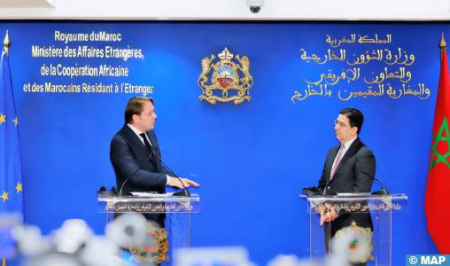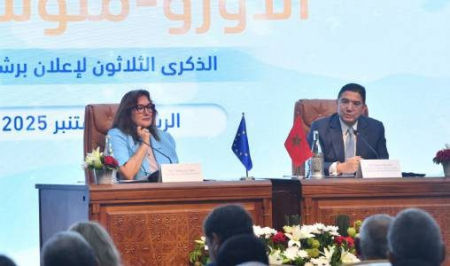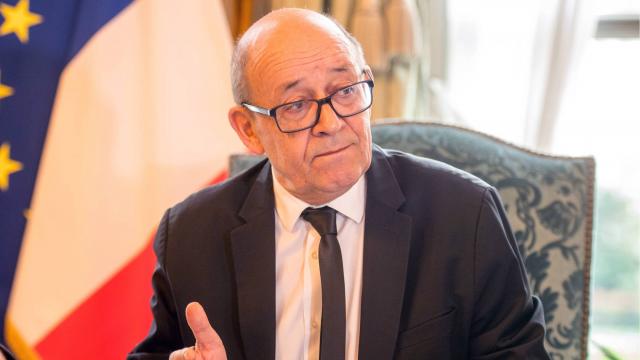Morocco is a flagship country and a pillar of stability in the region, said Thursday in Rabat, the European Commissioner for Neighborhood Policy and Enlargement, Olivér Várhelyi, who stressed the “extreme importance” of the Morocco-EU partnership.
In a global context marked by multiple challenges, it is not easy to find stable partners like Morocco, hence the “extreme importance” of the Morocco-EU partnership, said Várhelyi, who was speaking at a press briefing held after his talks with Foreign Minister Nasser Bourita.
The European Commissioner, currently on a working visit to the Kingdom, said that the signing this Thursday by Morocco and the EU of five cooperation programs worth nearly €500 million (5.5 billion dirhams) to support major reform projects in the Kingdom, reflects the “direct and serious” commitment from the Union to Morocco.
“With all our commitments, we are really changing the nature and depth of our cooperation,” he said, adding that the reforms launched in Morocco are ambitious reforms close to European values.
Morocco is and will be a major beneficiary of the EU’s project agenda for the entire region, said Várhelyi, adding that this financial support covers social, economic, agricultural, water and energy aspects, the latter being a crucial sector worldwide.
The Kingdom has the potential to become a source of energy not only for the region but also for Europe, said Várhelyi, making it clear that the European market is ready to receive energy from Morocco.
He also stressed the importance of other areas of cooperation between the Kingdom and the EU, including migration and the fight against criminal networks.
Regarding the resumption of relations with Israel, Várhelyi expressed the EU’s willingness to participate in this cooperation, which will help address the major challenges facing the region, including water management.
This trilateral cooperation, he said, will also address the challenges of research, development and rapprochement between peoples.
Nasser Bourita convened as to the need to develop a tripartite regional cooperation between Morocco, the European Commission and Israel, as a “complementary element to bilateral cooperation, which will encompass several areas through coordination between the three parties.”
“We have prepared a document that we will sign before the end of this month to consolidate the regional tripartite dimension in our relations, in areas of common interest,” he said.
The European Commissioner took the opportunity of the news conference to congratulate Morocco for its exit from the “gray” list of the Financial Action Task Force (FATF), praising the Moroccan-European cooperation that has allowed to achieve this result.
In this connection, Bourita said the reforms undertaken by the Kingdom have enabled it to get out of the gray list of the FATF, urging the EU to interact quickly with this news by removing Morocco from the gray list of the European Union.
Bourita also pointed out that Morocco’s relations with the European Union have never been as dense as they are today and that “the year 2023 will be the year of stronger commitment and ambitions” for the deepening of cooperation relations between the two parties in various areas. He mentioned in this context the implementation of the financial partnership agreements and the opening of new horizons of cooperation in the areas of security and migration, which will be further strengthened from this year.
Bourita expressed hope that the year 2023 will witness the expansion to other projects in the area of energy security that concern Morocco and the EU and be the year of the acceleration of the implementation of strategic projects, recalling that Morocco, under the leadership of King Mohammed VI, is surely advancing towards the implementation of its new development model in order to fulfil the aspirations of its citizens.
The visit to Morocco of the European Commissioner for Neighborhood Policy and Enlargement is the second of its kind in less than a year, “which confirms the depth, strength and solidity of relations between the Kingdom of Morocco and the European Commission,” he said.
The Minister voiced hope that this positive spirit and pragmatic approach characterizing relations between Morocco and the European Commission will continue in the long term, so that the partnership transcends mere speeches to take on a concrete dimension, thus contributing to the strengthening of ties between Morocco and the EU within the framework of the good neighbor policy.
He noted that “over the past three years, we have seen a change in the neighborhood policy towards the southern Mediterranean, with now a greater willingness to listen, a deeper dialogue and a willingness of the southern Mediterranean countries to own the projects we develop”.
This partnership, he said, has also deepened at the regional level through pilot projects implemented under this new approach.



